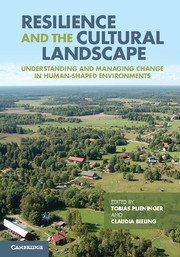 Resilience and the Cultural Landscape
Resilience and the Cultural Landscape Published online by Cambridge University Press: 05 November 2012
Introduction
This chapter starts from the contradiction that, while the empirical evidence demonstrates increasingly how inextricably humans have become embedded in earth surface and atmospheric processes, we maintain separationist ways of talking about things. Our dominant metaphors – cultural landscapes, social–ecological systems, human impacts, human interaction with the environment, anthropogenic climate change – all contain within them a dualistic construction of humans and the non-human world (often otherwise known as nature). The chapter makes broad comparisons between cultural landscapes approaches and social–ecological systems frameworks, as used in resilience thinking, in how they each conceptualise the human and human agency. These conceptualisations have political and policy implications for management decisions that are also discussed. The chapter then explores the possibilities of going beyond dualistic framings, using more relational perspectives.
Drawing on anglophone sources, I examine how the human–nature relationship has been conceptualised in the cultural landscape literature, and how these conceptualisations have changed over time. There are also significant geographical differences, as I show by comparing some Old and New World examples. In particular, I am concerned to interrogate the extent to which the human (including human processes and systems) has been conceptualised as separate to, and distinct from, the non-human or more-than-human world. I argue that much of the work of the cultural landscape concept, at least in the Anglo-American tradition (and its Australian manifestations), has been oppositional.
To save this book to your Kindle, first ensure [email protected] is added to your Approved Personal Document E-mail List under your Personal Document Settings on the Manage Your Content and Devices page of your Amazon account. Then enter the ‘name’ part of your Kindle email address below. Find out more about saving to your Kindle.
Note you can select to save to either the @free.kindle.com or @kindle.com variations. ‘@free.kindle.com’ emails are free but can only be saved to your device when it is connected to wi-fi. ‘@kindle.com’ emails can be delivered even when you are not connected to wi-fi, but note that service fees apply.
Find out more about the Kindle Personal Document Service.
To save content items to your account, please confirm that you agree to abide by our usage policies. If this is the first time you use this feature, you will be asked to authorise Cambridge Core to connect with your account. Find out more about saving content to Dropbox.
To save content items to your account, please confirm that you agree to abide by our usage policies. If this is the first time you use this feature, you will be asked to authorise Cambridge Core to connect with your account. Find out more about saving content to Google Drive.